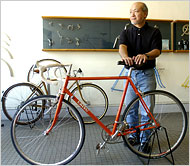Rare 1940’s and 50’s bike parts are displayed as artifacts behind glass. At the back of the shop are exquisite canvas-and-leather touring bags, woven willow baskets, handmade French tires and tiny brass bells from Japan.
Berkeley is big on bikes. The city is laced with well-used “bicycle boulevards” — streets modified for bike safety and convenience — and studded with overflowing bike racks. Stand in front of Jitensha Studio (jitensha is Japanese for bicycle) and you’re within a mile of five other cycling shops.
Hiroshi Iimura, 59, who opened Jitensha in 1982 to sell his custom-designed hand-built steel bicycles, is not fazed by competition. “Other places have production carbon fiber frames,” he said. “To me, they’re bulky, constructed like a bridge or a building. I don’t see any beauty there.”
Beauty reigns at this gallery-like shop, where only a handful of sleek, streamlined frames are on display, hanging from the ceiling like art objects. Rare 1940’s and 50’s bike parts are displayed as artifacts behind glass. At the back of the shop are exquisite canvas-and-leather touring bags, woven willow baskets, handmade French tires and tiny brass bells from Japan. Perched on a wooden rail, waiting to be picked up by its new owner, is Mr. Iimura’s most recent design — a dusky blue touring bike with a caramel-colored leather saddle, flat handlebars and shiny aluminum fenders.
Beauty rarely comes cheap: fully custom designs are $3,500 to $5,000, while semicustom bikes (made with stock hand-built frames) start at $2,800. Steel — lightweight, durable and comfortable to ride — is itself a relatively inexpensive material; Jitensha’s prices reflect the time and skill it takes to build a bicycle by hand using traditional time-honored materials and methods like lugging and brazing the steel tubes rather than welding them together.
Mr. Iimura, an industrial designer who helped develop the first-generation Honda Civic in the early 1970’s before channeling his favorite pastime into a new career, creates designs based on his customers’ riding preferences (racing versus commuting; nimble handling versus a more stable ride). He sends his detailed drawings and notes to a workshop in Tokyo, where craftsmen and their apprentices fastidiously cut, file and assemble the frame to his specifications, a process that takes up to four months. The completed frame is then sent back to Berkeley, where Mr. Iimura assembles the bicycle with Italian, Japanese and French parts.
“If a customer wants a component that is not to my taste, I refuse,” said Mr. Iimura, who credits his less-is-more aesthetic to his mechanical engineering background. “No brightly colored seats. No neon. Nothing flashy, nothing impractical.” If the customer protests, he sends him somewhere else. “I have to satisfy my own tastes first,” he said.
Jitensha at 2250 Bancroft Way, Berkeley, Calif.; 510-540-6240; www.jitensha.com. Open 11 a.m. to 5 p.m. Tuesday through Saturday.

